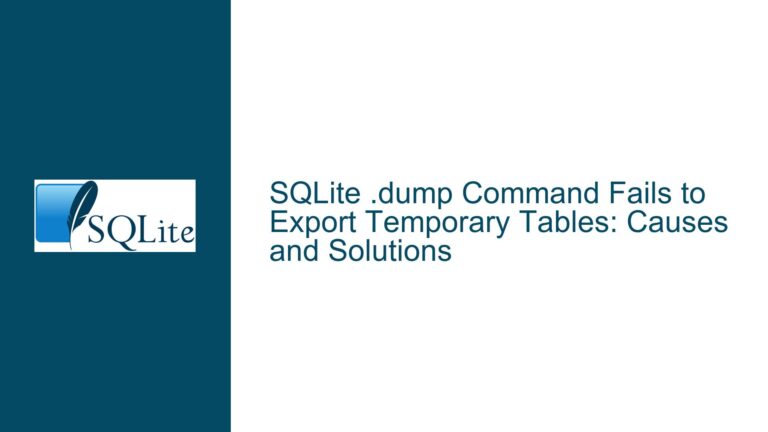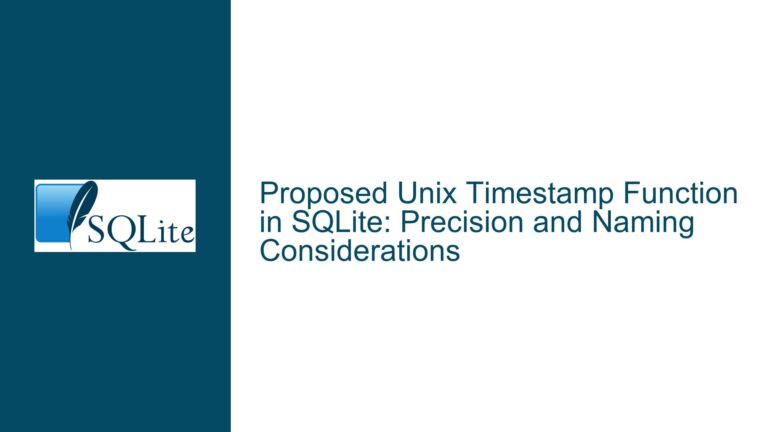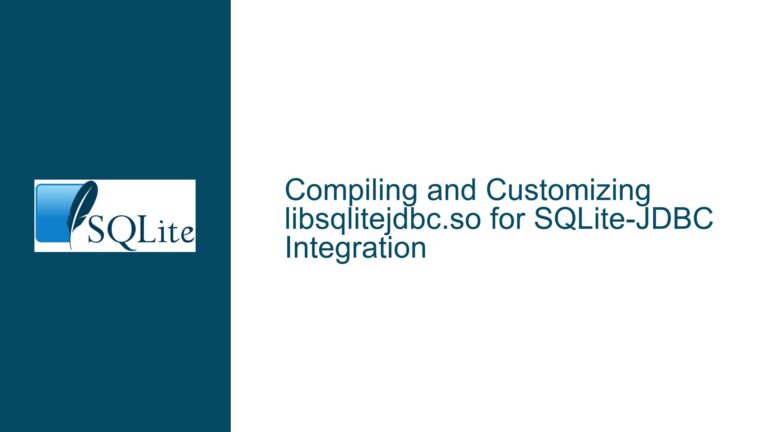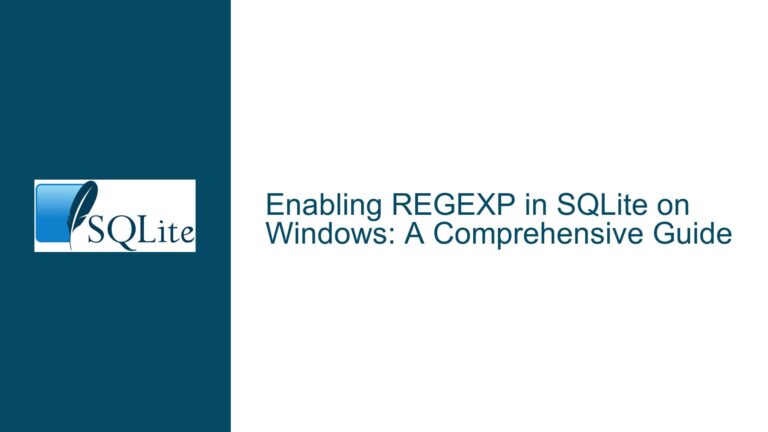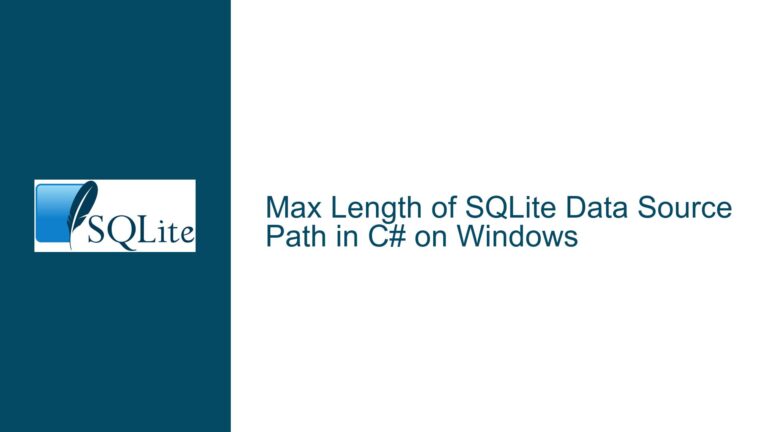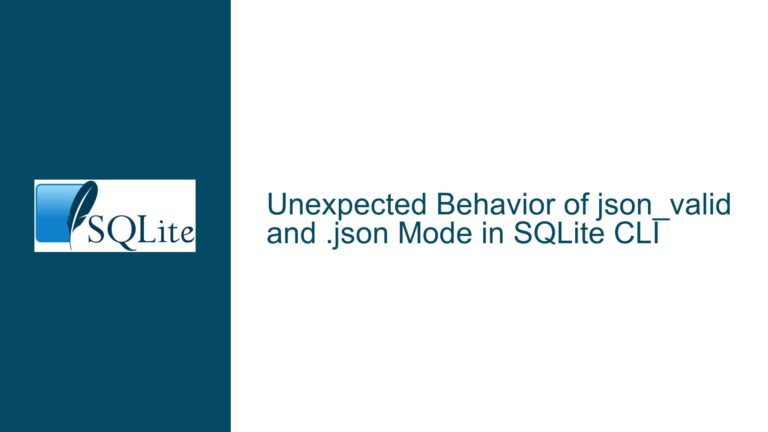Resolving Windows DLL Extension Loading Quirks in SQLite
Understanding Windows-Specific Behavior in sqlite3_load_Extension Filename Handling
The core challenge revolves around SQLite’s sqlite3_load_extension function exhibiting platform-specific behavior when handling shared library filenames on Microsoft Windows. Developers attempting to load extensions without file extensions (e.g., "MyExtension" instead of "MyExtension.dll") encounter unexpected failures due to implicit filename manipulation by the Windows API. This creates a conflict between SQLite’s cross-platform extension loading logic and Windows’ LoadLibrary conventions.
Windows modifies naked filenames (those without extensions) by automatically appending ".dll" during dynamic linking operations. SQLite’s current implementation attempts to handle this through a fallback mechanism that appends platform-specific extensions like ".dll" when initial loading fails. However, this creates a double-extension problem (e.g., "MyExtension.dll.dll") when combined with Windows’ automatic extension handling. The root conflict emerges from two competing filename resolution strategies:
- Windows’ mandatory extension completion in
LoadLibrary - SQLite’s automatic extension appending for cross-platform compatibility
This manifests specifically when developers:
- Deploy extension files without platform-specific extensions for consistency across operating systems
- Attempt to load Windows DLLs using base names without explicit ".dll" suffixes
- Rely on SQLite’s documented behavior of trying "various operating-system specific extensions"
The technical heart of the issue lies in SQLite’s azEndings array configuration for Windows builds, which currently prioritizes ".dll" suffix addition without accounting for Windows’ automatic extension handling. This results in failed file resolution sequences where the Windows API and SQLite both attempt to append extensions, creating invalid file paths.
Windows API Constraints and SQLite’s Extension Resolution Logic
Three primary factors contribute to the filename resolution conflict between SQLite and Windows:
1. LoadLibrary’s Automatic Extension Completion
The Windows API’s LoadLibrary function automatically appends ".dll" to any filename lacking an extension when attempting to locate library files. This behavior is hard-coded in the Windows loader and cannot be disabled through API parameters. To load a truly extension-less file, developers must append a trailing dot to the filename (e.g., "MyExtension.") to signal explicit rejection of automatic extension completion.
2. SQLite’s Extension Fallback Mechanism
SQLite implements platform-specific extension fallbacks through the azEndings array in loadext.c. For Windows, this array contains "dll", causing the loader to attempt appending ".dll" to the base filename if initial loading fails. This creates the following problematic resolution sequence:
- Attempt 1: Load "MyExtension" → Windows converts to "MyExtension.dll"
- Attempt 2: SQLite appends ".dll" → Tries "MyExtension.dll.dll"
3. Cross-Platform Filename Consistency Requirements
Organizations maintaining identical extension filenames across platforms face a dilemma: Either:
- Use platform-specific extensions (".dll", ".so", ".dylib"), requiring different load commands per OS
- Use extension-less filenames, which work on Unix-like systems but fail on Windows due to API constraints
The current SQLite implementation favors the first approach through its azEndings configuration, but developers seeking the second approach hit Windows-specific roadblocks due to the layered extension appending.
Comprehensive Solution Strategy for Windows Extension Loading
Step 1: Modify SQLite’s Extension Fallback Logic
Adjust the azEndings configuration and filename construction logic to account for Windows’ automatic extension handling. The optimal solution involves restructuring how SQLite appends extensions during the load attempt sequence:
Code Modification Plan
// Original Windows configuration
static const char *azEndings[] = {
"dll"
};
// Revised configuration
static const char *azEndings[] = {
".", // First attempt: naked filename with trailing dot
".dll" // Fallback to explicit DLL extension
};
Implementation Rationale
- Trailing Dot First: Attempt loading with an appended dot ("MyExtension.") to prevent Windows from adding ".dll". This matches the Windows API requirement for extension-less files.
- Explicit DLL Fallback: If the dot-appended version fails, try the conventional ".dll" extension for standard Windows libraries.
Step 2: Adjust Filename Construction Logic
Modify the filename generation code to properly concatenate base names with endings:
// Before
char *zAltFile = sqlite3_mprintf("%s.%s", zFile, azEndings[ii]);
// After
char *zAltFile = sqlite3_mprintf("%s%s", zFile, azEndings[ii]);
This change removes the forced dot between the base name and ending, allowing proper handling of the trailing dot strategy. The revised logic produces these resolution attempts for input "MyExtension":
- "MyExtension." (with trailing dot)
- "MyExtension.dll"
Step 3: Handle Load Order Prioritization
Ensure the load attempt sequence respects Windows’ peculiarities by trying the trailing dot strategy before conventional extensions. This maintains compatibility with both extension-less files and traditional DLLs while preventing double-extension conflicts.
Platform-Specific Implementation
Windows:
- First attempt:
LoadLibrary("MyExtension.")→ Loads "MyExtension" (no extension) - Second attempt:
LoadLibrary("MyExtension.dll")→ Loads conventional DLL
Unix-like Systems:
- First attempt:
dlopen("MyExtension")(no extension) - Second attempt:
dlopen("MyExtension.so")
macOS:
- First attempt:
dlopen("MyExtension") - Second attempt:
dlopen("MyExtension.dylib")
Step 4: Developer Workflow Adjustments
Instruct developers to use these patterns when loading extensions:
Cross-Platform Loading:
// Load extension without platform-specific extension
sqlite3_load_extension(db, "MyExtension", NULL, NULL);
Windows-Specific Loading:
// Directly specify extension when needed
sqlite3_load_extension(db, "MyExtension.dll", NULL, NULL);
Step 5: Testing and Validation
Implement comprehensive test cases covering:
Extension-less Windows DLL:
- File:
C:\extensions\MyExtension - Load command:
sqlite3_load_extension(db, "C:\\extensions\\MyExtension", ...) - Expected: Successfully loads using "MyExtension." resolution
- File:
Traditional Windows DLL:
- File:
C:\extensions\MyExtension.dll - Load command:
sqlite3_load_extension(db, "C:\\extensions\\MyExtension", ...) - Expected: Falls back to "MyExtension.dll" after initial failure
- File:
Unix Shared Object:
- File:
/extensions/MyExtension.so - Load command:
sqlite3_load_extension(db, "/extensions/MyExtension", ...) - Expected: Loads via ".so" fallback
- File:
Erroneous Double Extension:
- File:
C:\extensions\MyExtension.dll - Load command:
sqlite3_load_extension(db, "C:\\extensions\\MyExtension.dll", ...) - Expected: Skips fallback logic, loads directly
- File:
Step 6: Backward Compatibility Considerations
Maintain existing behavior for these cases:
- Explicit filenames with extensions (".dll", ".so", etc.) bypass fallback logic
- Mixed-case extensions handled by filesystem rules
- Absolute vs relative path resolution unchanged
Step 7: Build System Integration
Update SQLite compilation procedures to:
- Apply modified
azEndingsconfiguration for Windows builds - Maintain existing configurations for other platforms
- Include validation tests in CI/CD pipelines
Alternative Workaround: Developer-Supplied Extensions
For teams unable to modify SQLite’s source code, implement wrapper functions:
int win_load_extension(sqlite3 *db, const char *zFile, const char *zProc) {
char *zModified = sqlite3_mprintf("%s.", zFile);
int rc = sqlite3_load_extension(db, zModified, zProc, 0);
if(rc != SQLITE_OK) {
rc = sqlite3_load_extension(db, zFile, zProc, 0);
}
sqlite3_free(zModified);
return rc;
}
This workaround:
- First attempts loading with appended dot
- Falls back to original filename
- Maintains cross-platform compatibility when used with conditional compilation
Final Implementation Checklist
- Verify Windows API version compatibility
- Test 32-bit and 64-bit DLL loading
- Validate path resolution with spaces/special characters
- Confirm error message accuracy in failed load attempts
- Benchmark performance impact of additional load attempts
By systematically addressing Windows’ filename handling peculiarities through SQLite’s extension resolution logic, developers achieve consistent cross-platform behavior while respecting OS-specific loading requirements. The solution maintains backward compatibility, provides clear upgrade paths, and aligns with Microsoft’s API documentation for proper extension-less file loading.

